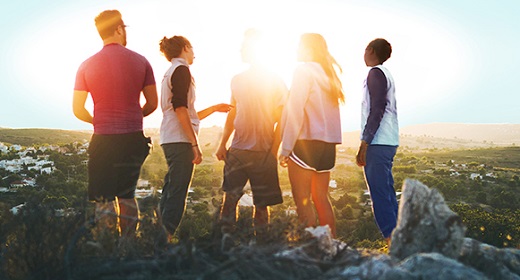by Nicole Bayes-Fleming: When disaster strikes, it’s hard not to panic. Practicing mindfulness can help manage stress, be it at home or abroad…
Even in the best of times, traveling can be stressful. There may be delays, unforeseen expenses, or just bad weather. Before I left on a four-month backpacking trip, I took all the necessary precautions—but I never predicted a pandemic would break out.
In the face of this global crisis—and a sudden, desperate need to get back to my home in Canada—I found myself relying more and more on practicing mindfulness. So, while I wait to hear if I get to go back home soon, I thought I’d share the five mindfulness lessons I learned recently while traveling during a pandemic.
Five Mindfulness Lessons for COVID-19 Stress
1. Take it one step at a time
My boyfriend and I were in a small town in Peru when the Peruvian government announced all borders out of the country would be shut in 24 hours. We were four hours from the nearest airport, our flights home weren’t for another month, and suddenly everyone we knew was texting us to ask if we were safe.
I knew we couldn’t let panic take over—instead, we came up with a plan. First we had to get on a bus. Then we had to buy a plane ticket. Finally, we had to get on a plane. Getting home was a huge task, but when we broke it into pieces, it felt a lot more manageable.
2. Practice compassion
Once we arrived at the airport in Lima, we were met with chaos. Flights were being canceled constantly and the line to buy tickets wrapped around itself three times. There were only a handful of employees behind each airline desk. No one we asked had any answers for us. People were cutting in line. And despite the serious and very contagious illness sending us all home, most of us were crowded shoulder to shoulder.
I wanted to yell: “Where are all your agents? Why isn’t there anyone to help us? We’ve been waiting here forever! Can I at least have a face mask?!”
Instead, I stopped and took a moment to reflect on all the customer service positions I have worked in my life, all the times customers blamed me for things I had no control over, the one time a particularly sharp-tongued man made me cry. I realized these airport employees probably had fewer answers than we did. They were just trying their best on what was, almost certainly, the worst shift they’d ever worked.
When I finally spoke to an agent after nine hours in line, she told me there were no international flights left. She looked as tired as I felt. I didn’t yell like I wanted to—instead, I thanked her.
3. Notice small acts of kindness
As flights sold out and ticket prices skyrocketed, it became increasingly clear we weren’t making it home. It would have been easy to dwell on everything going wrong. In all honesty, there was a moment or two when I felt close to tears. But then I noticed that, amongst all the chaos and frustration, there was still kindness. People saved strangers’ spots in line while they ran off to the bathroom, or to get food. A man with a case of clean water offered to refill the bottles of those around him. When we finally had to leave the airport and our phones were dead, a fellow traveler called us an Uber.
Even in the darkest moments, there is good to be found if you take the time to look for it.
4. Be patient with loved ones
As we tried to get home, my mom sent me endless texts begging me to book a $6000 flight she had found. My dad sent me texts saying it was no big deal and I was better off to go back to the hostel. My boyfriend was constantly looking up news alerts, running his hands through his hair, suggesting we try this airline or that one.
Everyone handles stress differently, and at this uncertain time, it’s more important than ever to be patient with friends and family who care deeply about your well-being.
The conflicting advice and barrage of opinions were driving me crazy, but I realized how fortunate I was that so many people were worried about me. Everyone handles stress differently, and at this uncertain time, it’s more important than ever to be patient with friends and family who care deeply about your well-being.
5. Focus on the here and now
For now, my boyfriend and I are stuck in Peru. It’s hard not to be crushed by it all—the end of our dream trip, which was the culmination of months and months of planning, the inability to get home after trying so hard, the sudden lack of security in the world.
And yet, the truth is that we are lucky. We are privileged. We have a place to stay and food to eat. No one we know is sick. We had a chance to see the world before it shut down. Instead of dwelling on what could happen next or feeling sad, I’ve decided to just focus on this moment—to accept the hard truths and feel grateful for the positive ones. There is sun outside my window, there is music on the radio, there are jokes my sister sends me over Facebook. When life becomes chaotic, the best thing we can do is connect to the present moment, as it is.
This morning my boyfriend said to me, “I can’t believe how calm you are in all this.” Maybe it’s just my personality. Or, maybe, it’s mindfulness.





















































